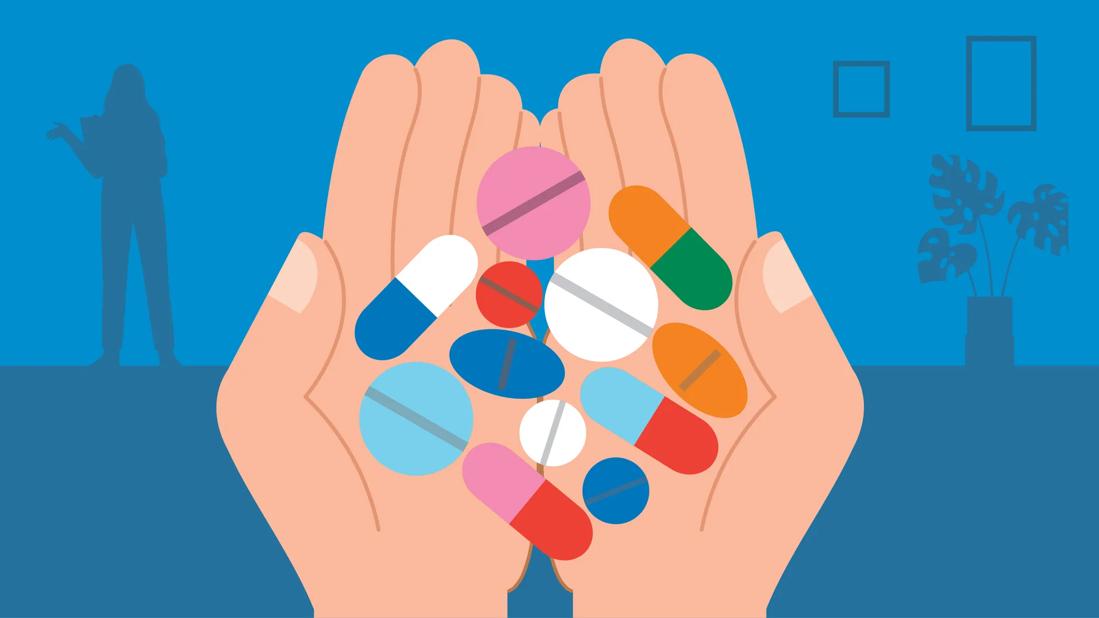Over-the-counter pills, powders, extracts and tinctures can interact with other medications and cause unexpected side effects

Image content: This image is available to view online.
View image online (https://assets.clevelandclinic.org/transform/a2592e28-d932-4d45-b62e-1b209d45169e/hands-hold-pills-doc-office-1495644674)
Two hands full of supplement tablets, pills and capsules, with healthcare provider in background
Every time you head to the doctor’s office, it’s the same question: “What medications are you taking?” While you likely list all of your regular prescription medications, your over-the-counter medications and supplements matter, too. Your healthcare provider needs to know about anything you take regularly, including:
Advertisement
Cleveland Clinic is a non-profit academic medical center. Advertising on our site helps support our mission. We do not endorse non-Cleveland Clinic products or services. Policy
Here’s why it’s so important.
Just as prescription medications can interact with one another, so, too, can they interact with over-the-counter medications and supplements. Your healthcare provider needs a complete list of what you’re taking so they can be on the lookout for possible drug interactions, including when they write you a new prescription.
“Let’s say, for example, that you have an infection, and your doctor puts you on an antibiotic,” poses family medicine specialist Matthew Goldman, MD. “Calcium and iron supplements can bind to certain antibiotics, making it harder for your body to absorb them, which, ultimately, makes that medication less impactful on your infection.”
There are many other examples of how over-the-counter supplements can interact with prescription medications, like:
Advertisement
These are just a few of the many instances that drive home why your provider needs to know exactly what you take.
“If you already have certain medical conditions, supplements can bring added risks,” Dr. Goldman warns. “Your provider needs to know what you take so they can make informed decisions about your care.”
Here are a few examples:
Too much of a good thing can be harmful. When you determine your own supplement dosage, you risk serious side effects and even overdosing.
For example:
Another problem? You might not even realize you’re taking too much.
“Sometimes, multivitamins and other combination supplements have overlapping ingredients,” Dr. Goldman explains, “so you may be getting more of one substance than you realize.”
There’s also the fact that the U.S. Food and Drug Administration (FDA) categorizes supplements as foods, not drugs. That means they aren’t regulated with the same standards as pharmaceutical medications, so you can’t always be sure the dosages are precise.
Importantly, dosage is mostly a supplement-specific problem. Dr. Goldman says you’re typically not at risk of vitamin overdoses from the foods you eat (though some exceptions exist). So, it’s always better to focus on diet than to add extra pills to the mix.
A lack of FDA regulation means supplement manufacturers don’t have to disclose possible side effects on their packaging. But just like medications, dietary supplements can bring unwanted side effects.
There are lots of examples, like the fact that oral aloe supplements can decrease potassium levels or that the active ingredient in licorice root can increase blood pressure.
“If you don’t tell your healthcare provider which supplements you take, they don’t have all the information they need to accurately troubleshoot any symptoms you’re experiencing,” Dr. Goldman reiterates.
Advertisement
It may not seem like a big deal to add extra vitamins or herbal supplements to your daily medication regimen. But given the trouble that these over-the-counter options can sometimes cause, your healthcare provider needs to know exactly what you take, including:
Worried you’ll forget what you take or leave something off the list the next time you head into an appointment? Dr. Goldman shares a tip for staying thorough and organized.
“Bring your over-the-counter medications, supplements and vitamins with you to your appointment so your provider can see exactly what’s in them,” he recommends. “If you can’t do that, take pictures of the labels.”
Then, maintain an updated list of everything you take, whether it’s written on a piece of paper that you keep in your wallet or stored in an app on your phone. That way, when the doctor’s office asks you, “What medications are you taking?” you’ll be able to simply show them the list.
Advertisement

Sign up for our Health Essentials emails for expert guidance on nutrition, fitness, sleep, skin care and more.
Learn more about our editorial process.
Advertisement
They claim to boost energy and improve longevity, but there’s currently not enough research to confirm these benefits
Certain supplements, like licorice root and St. John’s wort, can raise your blood pressure or negatively interact with medication
Properly prepared, elderberries can be a safe and healthy part of a balanced diet — just steer clear of supplements
Science doesn’t support most claims about this bee byproduct, and supplements have potential risks
The meat-based elimination diet restricts important food groups — like fruits and vegetables — that keep you healthy
Eat your fill of vitamins C, B6 and E, plus zinc and selenium
The vitamins, minerals and other nutrients in the food you eat are essential for a healthy heart, but supplements are another story
Early research shows that this supplement may help, but more studies are needed
Prioritize your health by managing stress, strengthening your social connections and getting quality sleep
Bolsters, blankets, pillows and blocks can offer extra support, stability and comfort
Allergies, postnasal drip, asthma or reflux could be to blame for a cough that won’t quit